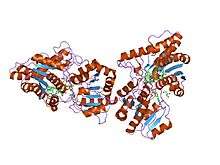Glucuronosyltransferase
Uridine 5'-diphospho-glucuronosyltransferase (UDP-glucuronosyltransferase, UGT) is a microsomal glycosyltransferase (EC 2.4.1.17) that catalyzes the transfer of the glucuronic acid component of UDP-glucuronic acid to a small hydrophobic molecule. This is a glucuronidation reaction.[2][3]
| Glucuronosyltransferase | |||||||||
|---|---|---|---|---|---|---|---|---|---|
| Identifiers | |||||||||
| EC number | 2.4.1.17 | ||||||||
| CAS number | 9030-08-4 | ||||||||
| Databases | |||||||||
| IntEnz | IntEnz view | ||||||||
| BRENDA | BRENDA entry | ||||||||
| ExPASy | NiceZyme view | ||||||||
| KEGG | KEGG entry | ||||||||
| MetaCyc | metabolic pathway | ||||||||
| PRIAM | profile | ||||||||
| PDB structures | RCSB PDB PDBe PDBsum | ||||||||
| Gene Ontology | AmiGO / QuickGO | ||||||||
| |||||||||
| UDP-glucuronosyl and UDP-glucosyl transferase | |||||||||
|---|---|---|---|---|---|---|---|---|---|
 Structure of TDP-vancosaminyltransferase GtfD as a complex with TDP and the natural substrate, desvancosaminyl vancomycin.[1] | |||||||||
| Identifiers | |||||||||
| Symbol | UDPGT | ||||||||
| Pfam | PF00201 | ||||||||
| InterPro | IPR002213 | ||||||||
| PROSITE | PDOC00359 | ||||||||
| SCOPe | 1rrv / SUPFAM | ||||||||
| Membranome | 476 | ||||||||
| |||||||||
Alternative names:
- glucuronyltransferase
- UDP-glucuronyl transferase
- UDP-GT
Function
Glucuronosyltransferases are responsible for the process of glucuronidation, a major part of phase II metabolism. Arguably the most important of the Phase II (conjugative) enzymes, UGTs have been the subject of increasing scientific inquiry since the mid-to-late 1990s.
The reaction catalyzed by the UGT enzyme involves the addition of a glucuronic acid moiety to xenobiotics and is the most important pathway for the human body's elimination of the most frequently prescribed drugs. It is also the major pathway for foreign chemical (dietary, environmental, pharmaceutical) removal for most drugs, dietary substances, toxins and endogenous substances. UGT is present in humans, other animals, plants, and bacteria. Famously, UGT enzymes are not present in the genus Felis,[4] and this accounts for a number of unusual toxicities in the cat family.
The glucuronidation reaction consists of the transfer of the glucuronosyl group from uridine 5'-diphospho-glucuronic acid (UDPGA) to substrate molecules that contain oxygen, nitrogen, sulfur or carboxyl functional groups.[5] The resulting glucuronide is more polar (e.g. hydrophilic) and more easily excreted than the substrate molecule. The product solubility in blood is increased allowing it to be eliminated from the body by the kidneys.
Diseases
A deficiency in the bilirubin specific form of glucuronosyltransferase is thought to be the cause of Gilbert's syndrome, which is characterized by unconjugated hyperbilirubinemia.
It is also associated with Crigler–Najjar syndrome, a more serious disorder where the enzyme's activity is either completely absent (Crigler–Najjar syndrome type I) or less than 10% of normal (type II).
Infants may have a developmental deficiency in UDP-glucuronyl transferase, and are unable to hepatically metabolize the antibiotic drug chloramphenicol which requires glucuronidation. This leads to a condition known as gray baby syndrome.[6]
Causes
Causes of unconjugated hyperbilirubinemia are divided into three main categories, namely, excessive bilirubin synthesis, liver bilirubin uptake malfunction, and bilirubin conjugation compromise.[7]
As to excessive bilirubin synthesis, both intravascular hemolysis and extravascular hemolysis can involve in the pathophysiology.[7] Additionally, dyserythropoiesis and extravasation of blood into tissues such as angioedema and edema can also lead to indirect hyperbilirubinemia, along with heart failure, medication-induced, ethinyl estradiol, chronic hepatitis, and cirrhosis that are, otherwise, attributed to hepatic bilirubin mal-uptake and bilirubin conjugation compromise, respectively.[7]
Genes
Human genes which encode UGT enzymes include:
- B3GAT1, B3GAT2, B3GAT3
- UGT1A1, UGT1A3, UGT1A4, UGT1A5, UGT1A6, UGT1A7, UGT1A8, UGT1A9, UGT1A10
- UGT2A1, UGT2A2, UGT2A3, UGT2B4, UGT2B7, UGT2B10, UGT2B11, UGT2B15, UGT2B17, UGT2B28
References
- Mulichak AM, Lu W, Losey HC, Walsh CT, Garavito RM (May 2004). "Crystal structure of vancosaminyltransferase GtfD from the vancomycin biosynthetic pathway: interactions with acceptor and nucleotide ligands". Biochemistry. 43 (18): 5170–5180. doi:10.1021/bi036130c. PMID 15122882.
- King C, Rios G, Green M, Tephly T (2000). "UDP-glucuronosyltransferases". Curr Drug Metab. 1 (2): 143–161. doi:10.2174/1389200003339171. PMID 11465080.
- "UDP-glucuronosyltransferase 1-1". Drugbank. Retrieved 21 November 2019.
- Court MH; Greenblatt DJ (2000). "Molecular genetic basis for deficient acetaminophen glucuronidation by cats: UGT1A6 is a pseudogene, and evidence for reduced diversity of expressed hepatic UGT1A isoforms". Pharmacogenetics. 10 (4): 355–69. doi:10.1097/00008571-200006000-00009. PMID 10862526.
- Bock K, Köhle C (2005). "UDP-glucuronosyltransferase 1A6: structural, functional, and regulatory aspects". Methods Enzymol. Methods in Enzymology. 400: 57–75. doi:10.1016/S0076-6879(05)00004-2. ISBN 9780121828059. PMID 16399343.
- MacDougall, C; Chambers, HF (2011). "55". Protein Synthesis Inhibitors and Miscellaneous Antibacterial Agents. In: Brunton LL, Chabner BA, Knollmann BC, eds. Goodman & Gilman's The Pharmacological Basis of Therapeutics (12 ed.). New York: McGraw-Hill. Retrieved October 19, 2011.
- Namita Roy-Chowdhury, PhD, FAASLDJayanta Roy-Chowdhury, MD, MRCP, AGAF, FAASLD. "Diagnostic approach to the adult with jaundice or asymptomatic hyperbilirubinemia". UpToDate. Section Editor:Sanjiv Chopra, MD, MACPDeputy Editor:Shilpa Grover, MD, MPH, AGAF. Retrieved 2019-07-17.CS1 maint: uses authors parameter (link) CS1 maint: others (link)
External links
- Glucuronosyltransferase at the US National Library of Medicine Medical Subject Headings (MeSH)